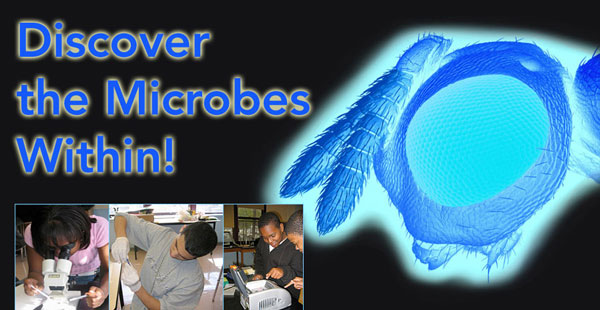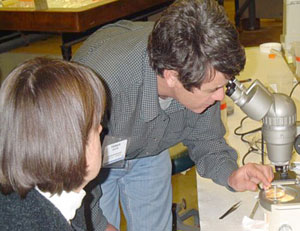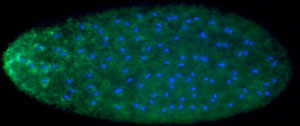 |

 |
 |
Instructor Bob Minckley identifies an insect with a workshop participant.
|
|
January 22, 2010
MBL, WOODS HOLE, MA—Discover the Microbes Within: The Wolbachia Project is designed for high school biology educators in an effort to modernize biology labs and lesson plans with discovery-based labs and biotechnology. This integrative lab series is founded on the principle that students want to learn science the way science is done, and in so doing, students enhance their understanding of biology and scientific inquiry while collecting reliable data new to the scientific community.
The workshop will be held at MBL Apr. 23-25, 2010. More information and the application can be found at http://discover.mbl.edu. Discover the Microbes Within! is supported by MBL and the HHMI Pre-college Education Program.
A Professional Development Workshop, Integrative Lab Series, and Year-Round Partnership
Wolbachia is a symbiotic bacterium that lives in at least 20 percent of the world's arthropods, including insects, spiders, mites, and crustaceans. Wolbachia pipientis has become a model organism to study animal-microbe interactions, evolution, genetics, ecology, and human health. Join us in our studies of this fascinating microorganism.
Teacher training occurs annually at a spring workshop on the campus of the Marine Biological Laboratory in Woods Hole, MA or through special in-service training events. Implementation of the labs in your classroom is facilitated by partnerships with the Wolbachia scientific community, online digital resources, downloadable labs and lectures, a free loaner equipment program, and a DNA sequencing partnership with the program director's lab at MBL.
 |
 |
|
Insect embryo showing the dividing insect chromosomes (blue) and Wolbachia pipientis bacteria (bright green) localized to the pointed end of the embryo (photo Michael Clark)
|
The lab series brings you initially through the process of collecting and identifiying arthropod species in your local fauna that potentially hosts to Wolbachia symbionts. You will extract DNA and amplify genes to obtain the DNA sequences of potentially new genetic strains of Wolbachia unknown to the scientific community. You could discover entirely new lineages or hosts of Wolbachia! Finally, you can determine the evolutionary relatedness of your Wolbachia strains to other sequences published by scientists in the NCBI national genetic database and the insects can be added to the Encyclopedia of Life database.
The lab modules can be either individually incorporated into daily lesson plans addressing National Science Education Standards or used as a coherent unit progressively emphasizing the nature of a long-term science project throughout the school year. The full lab series teaches observation, conceptualization, the scientific method, and major concepts in systematics and biodiversity, genomic DNA isolation, biotechnology, DNA sequencing, bioinformatics, and molecular evolution.
|